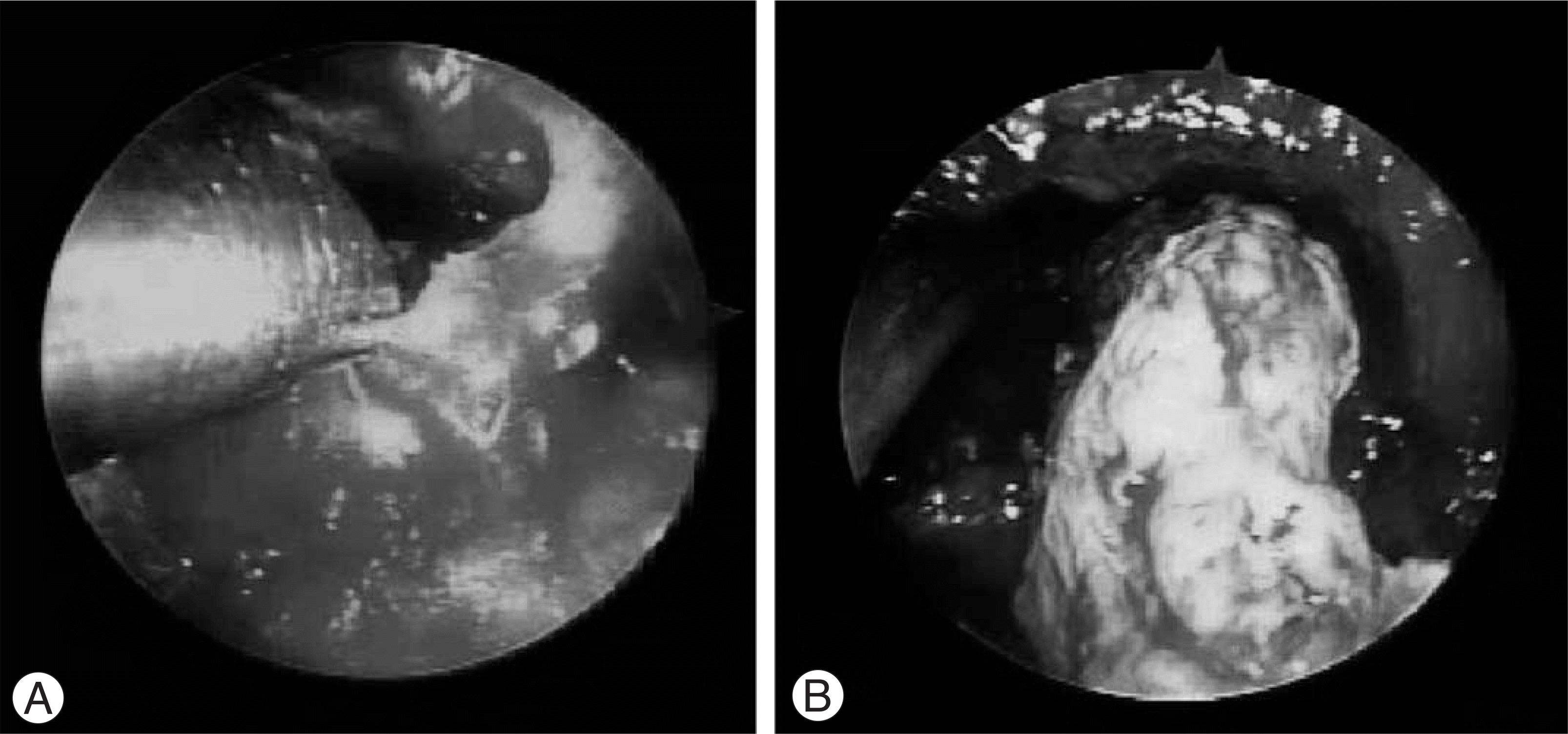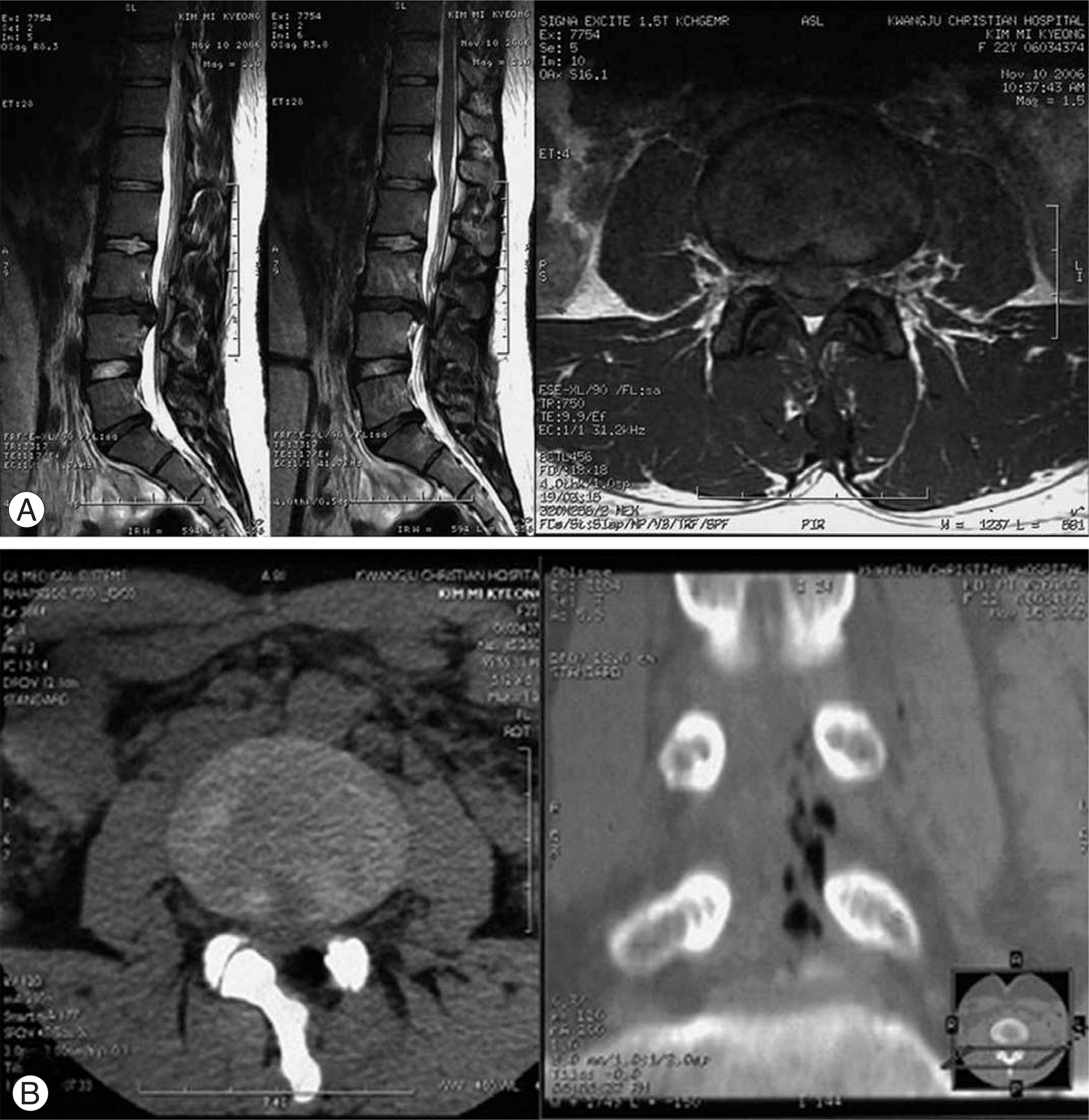Abstract
Objectives
To compare the surgical results of microendoscopic discectomy using a tubular retractor with those of a conventional discectomy for lumbar herniated nucleus pulposus.
Summary of Literature Review
Minimally invasive approaches to the lumbar spine have been attempted with success over the past 25 years.
Materials and Methods
This study examined 36 cases who underwent lumbar discectomy using a tubular retractor and microendoscopy (Group A) and 30 cases who underwent a conventional discectomy (Group B). The operating time, intraoperative blood loss, postoperative hospital stay were recorded. The clinical results were assessed using the Korea Version Oswestry Disability Index (KODI), and the radiological results were evaluated from changes in disc height.
Results
The patients in Group A had a longer operation time(mean, 95.56±23.57 minutes vs 81.17±35.30 minutes, p=0.062), less intraoperative blood loss (mean, 58.61±97.08 cc vs 161.00±88.64 cc, p=0.001) and a shorter hospitalization stay (mean, 8.22 ±4.99 days vs 17.33±10.98 days, p=0.001) than group B. There was significant improvement in the mean KODI score for Group A; 6.36±7.18 and Group B; 5.97±5.14. However, there was no significant difference in the pain improvement (mean, 1.14 ±1.15 vs 1.30±1.06, p=0.559) and walking index (mean, 0.25±0.44 vs 0.30±0.47, p=0.656). In terms of social life, Group A had better results (mean, 0.20±0.48 vs 0.67±1.01, p=0.018). The disc height according to radiography decreased from 8.44±1.98 mm to 7.40±1.59 mm in Group A and 9.07±1.93 mm to 7.67±1.90 mm in Group B, but there were no statistical differences in the changes in disc height between the two groups (p=0.143).
Go to : 
REFERENCES
01). Gibson JN., Waddell G. Surgical interventions for lumbar disc prolapse: updated Cochrane Review. Spine. 2007. 32:1735–1747.
02). Dandy WE. Loose cartilage from intervertebral disc simulating tumor of the spinal cord. 1929 Clin Orthop Relat Res. 1989. 238:4–8.
03). Mixter WJ., Barr JS. Rupture of the intervertebral disc with involvement of the spinal canal. N Eng Surg Soc. 1934. 211:210–2154.

04). Hijikata S., Yamagishi M., Nakayama T. Percutaneous discectomy: A new treatment method for lumbar disc herniation. J Toden Hosp. 1975. 5:5–13.
05). Kambin P., Sampson S. Posterolateral percutaneous suction excision of herniated lumbar intervertebral discs: report of interim results. Clin Orthop Relat Res. 1986. 207:37–43.
06). Onik G., Maroon J., Shang YL. Far-lateral disc herniation; treatment by automated percutaneous diskectomy. AJNR. 1990. 11:865–868.
07). Hijikata S. Percutaneous nucleotomy: A new concept technique and 12 years' experience. Clin Orthop Relat Res. 1989. 238:9–23.
08). Kambin P., Zhou L. Arthroscopic discectomy of the lumbar spine. Clin orthop Relat Res. 1997. 337:49–57.

09). Schreiber A., Suezawa Y., Leu H. Does percutaneous nucleotomy with discoscopy replace conventional discectomy? Eight years of experience and results in treatment of herniated lumbar disc. Clin Orthop Relat Res. 1989. 238:35–42.
10). Foley KT., Smith MM. Microendoscopic discectomy. Tech Neurosurg. 1997. 3:301–307.
11). Foley KT., Smith MM., Rampersaud YR. Microendoscopic approach to far-lateral lumbar disc herniation. Neurosurg Focus. 1999. 7:e5.

12). Dirksmeier PJ., Parsons IM., Kang JD. Microendoscopic and open laminectomy and discectomy in lumbar disc disease. Semin Spine surg. 1999. 11:138–146.
13). Findlay GF., Hall BI., Musa BS., Oliveria MD., Fear SC. A 10-year follow-up of the outcome of lumbar microdiscectomy. Spine. 1998. 23:1168–1171.

14). Kambin P. Posterolateral percutaneous lumbar interbody fusion. In Kambin P. Arthroscopic microdiscectomy: Minimal intervention in spinal surgery. Baltimore, Urban & Schwarzenberg;p. 117–121. 1991.
15). Jeon CH., Kim DJ., Kim DJ., Lee HM., Park HJ. Cross-cultural Adaptation of the Korean Version Of the Oswestry Disability Index (ODI). Journal of Korean Society of Spine Surgery. 2005. 12:146–149.

16). Chao Z., Yue Z., Tong-wei C., Jian W., Yong H., Yong P. Microendoscopic discectomy, a less traumatic procedure for lumbar disk herniation. Chin J Traumatol. 2007. 10:311–314.
17). Kambin P. Arthroscopic lumbar interbody fusion in white. Spine Care. St. Louis: CV Mosby;p. 1055–1066. 1995.
18). Chung JY., Lee JJ. Percutaneous endoscopic discectomy for lumbar disc herniation. J Korean Spine Surg. 2007. 14:212–219.

19). Schick U., Do¨hnert J., Richter A., Ko¨nig A., Vitzthum HE. Microendoscopic lumbar discectomy versus open surgery: an intraoperative EMG study. Eur Spine J. 2002. 11:20–26.

20). Muramatsu K., Hachiya Y., Morita C. Postoperative magnetic resonance imaging of lumbar disc herniation: comparison of microendoscopic discectomy and Love's method. Spine. 2001. 26:1599–1605.
21). Wu X., Zhuang S., Mao Z., Chen H. Microendoscopic discectomy for lumbar disc herniation: surgical technique and outcome in 873 consecutive cases. Spine. 2006. 31:2689–2694.
Go to : 
 | Fig. 1.Endoscopic findings. (A) Laminotomy is done under tubular retractor and microendoscopy. (B) Endoscopic discectomy is doing. |
 | Fig. 2.A 22 year-old woman with HNP L4-5. (A) Preoperative MRI shows herniated nucleus pulposus at L4-5. (B) Immediate postoperative computed tomographs shows hematoma compression at laminotomy area and spinal canal. |
Table 1.
The results of operative procedures.
Table 2.
Clinical and radiological results




 PDF
PDF ePub
ePub Citation
Citation Print
Print


 XML Download
XML Download